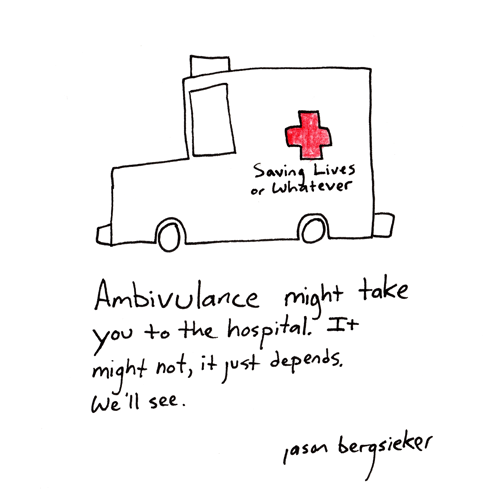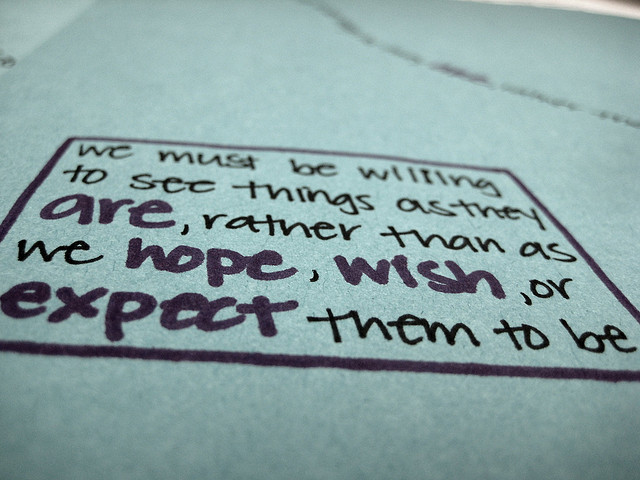Step One – Overcoming ambivalence
Merriam-Websters defines ambivalence as “simultaneous and contradictory attitudes or feelings (as attraction and repulsion) toward an object, person or action.”
Ever feel that way about, oh say… nutrition, sleep and exercise? Part of you knows you’re supposed to treat your body well, but the world calls and the Starbucks is on the way to wherever you need to get to so urgently?
Maybe you’ve already lived that life for the last 20 years and now you’re finding that sugar, nicotine, alcohol or substances not so readily named are taking a cumulative toll? Too much body fat, a smokers hack or the inability to sleep without a little help? Every day a nagging voice tells you that lifestyle changes are needed, but you’ll deal with it tomorrow?
Or, worst case, you’ve been ignoring the early warning signs and now your doctor and family are throwing out scary words like morbid obesity, heart disease, diabetes… and you’re not even “old” yet. Now, you’re really motivated to get it together, but part of you still hesitates.
I’ve lived these lives… my mom died of complications from lung cancer and acute alcoholism. It took me another eleven years to quit drinking and three more after that to quit smoking. It’s not like I certainly didn’t know what the substances were doing to my health and the thoughts tortured me for years… I’d quit for a week or two then give up, saying to myself I just need to wait until after vacation, after the holidays, after I lose 10 pounds… I used to call it “being impaled on horns of a dilemma”.
The book Motivational Interviewing (W. Miller & S Rolnick) provides an excellent synopsis of ambivalence along with an explanation of the insanity. “…ambivalence is a common human experience and a stage in the normal process of change. Getting stuck in ambivalence is also common, and approach-avoidance conflicts (ex: alcoholics who drink and diabetics who eat sweets) can be particularly hard to resolve on one’s own. Resolving ambivalence can be a key to change, and, indeed, once ambivalence has been resolved, little else may be required for change to occur. However, (and here’s the linchpin…) attempts to force resolution in a particular direction (as by direct persuasion or by increasing punishment for one action) can lead to a paradoxical response, even strengthening the very behavior they were intended to diminish.”
How many of you have tried to convince a loved one to seek help, only to have them dig their heels in deeper? Yep, I was one of those too. The more I was badgered the less willing I was to change, even though in my heart I wanted the change too.
So, what actually does work? Well, it’s a combination of almost magical factors…
First, you have to become uncomfortable enough with the problem that you become willing to do something different. Second, you need to have sufficient confidence in your ability to accomplish the change. Third, you have to want the change badly enough that you are ready to do whatever it takes to start.
A simple example of ambivalence resolution is taking a college class and getting low marks on the first quiz because you spent your study time hanging out with friends. If your ending grade matters sufficiently and you know you can improve it with proper study, then you change your habits to make sure you get high marks through the rest of the course. Result? A+ , of course!
But what about the seriously ingrained harmful habits like I listed earlier? The ones that just don’t give up that easily. Yes, you still have to become sufficiently uncomfortable, believe you can change and want something else more…. but sometimes you also need help. Sometimes you’re so stuck that no amount of individual effort seems to be enough. That was my experience. It wasn’t until I admitted I needed help that the magic of change started to happen.
So, I ask you now…
Are you impaled on the horns of ambivalence? It doesn’t matter if the lack of manageability comes from too much work, food, drink, or anything else. When you’ve had enough, there are many resources of assistance available, myself included. You just have to ask.



